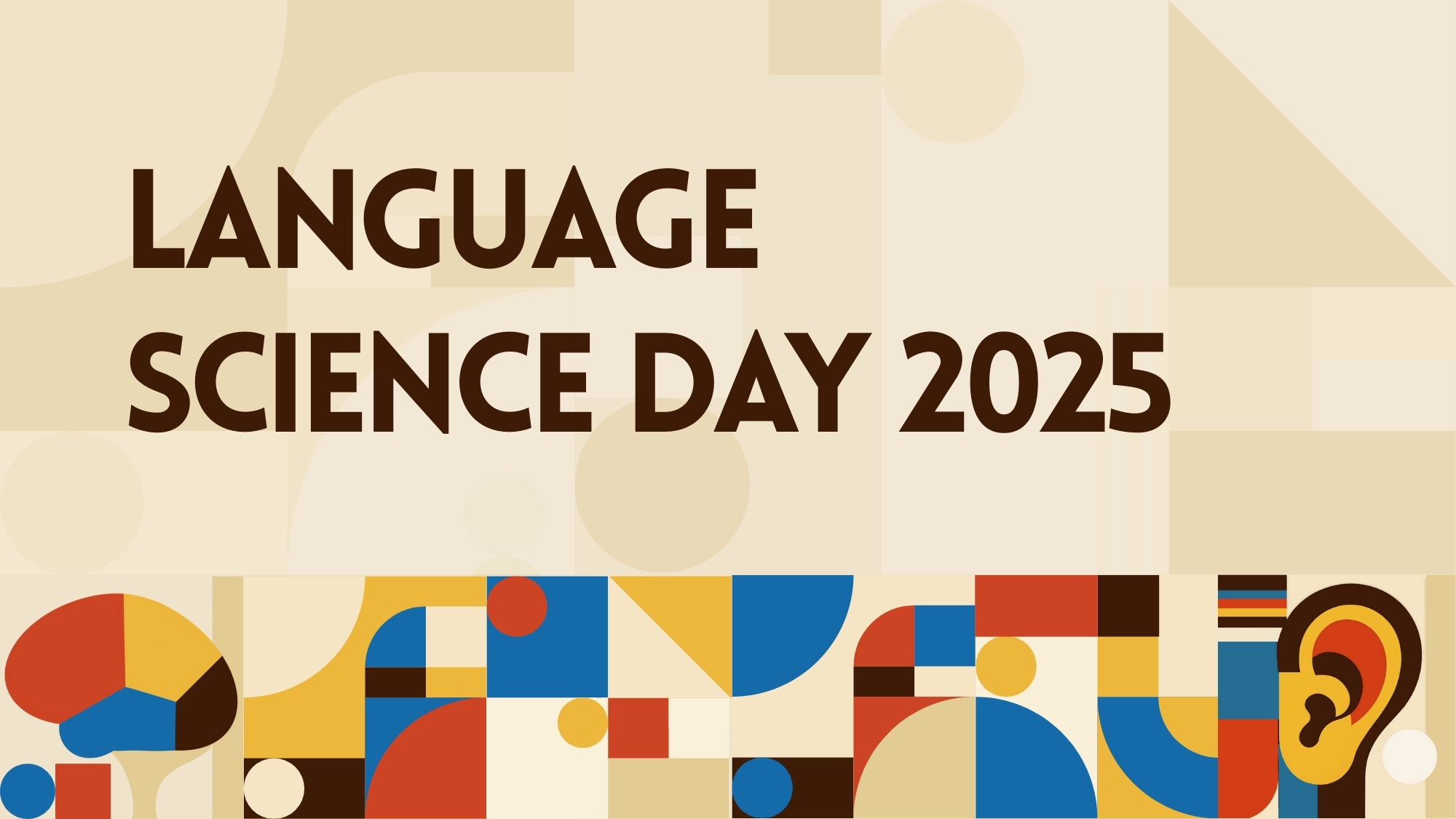Language Science Day 2025
The 15th annual Language Science Day is here! Registration is open until September 15th, 2025 at 5:00 PM.
- When? September 19th, 2025 from 12:00 PM to 5:00 PM
- Where? Language Science Center, 2130 HJ Patterson Hall
Event Details
Lunch • 12:00 PM
Room 2130
Join us for a catered lunch. Reconnect with language scientists from other departments and meet new members of the UMD community.
Quiet/Break Room: 2123 HJ Patterson Hall
Breakout Sessions • 1:00 - 1:50 PM
More than one brain: Studying conversation
Room 2242
Most language research in linguistics, cognitive science, and even speech and communication sciences focuses on monologue: a single person producing or comprehending language, most often isolated sentences. But all child language development and the majority of language use happens in the context of conversation and social interaction. What do we miss by studying only monologue? What new methods can help us study conversation?
Panelists:
- Rachel Romeo (HDQM)
- Megh Krishnaswamy (EDSI)
- Kelly Marshall (NACS)
- Neha Srikanth (CS)
Moderator: Shevaun Lewis (LSC)
LLMs in research and practice
Room 2114 & 2118
Since LLMs blew up 3 years ago, language scientists across all fields have been grappling with how they can or should be used in research and practice. Are they a useful tool for experimental research? A model for human development or language processing? A practical clinical tool? UMD researchers are exploring the potential uses and risks of this technology.
Panelists:
- Jing Liu (TLPL)
- Sathvik Nair (LING)
- José Ortiz (HESP)
- Rachel Rudinger (CS)
Moderator: Katherine Howitt (LING)
The Logic of Modeling in Language Science
Room 1102
This panel will explore the scientific logic of using computational models in language science, examining what constitutes a good model of language processing. What metrics might demonstrate that models are capturing the underlying mechanism? Specifically, we will debate whether predicting trial-by-trial neural activity and behavioral data is sufficient, or if additional criteria are needed to evaluate model validity.
Panelists:
- Yi Ting Huang (LSC/HESP)
- Philip Resnik (LING/UMIACS)
- Jonathan Simon (ECE/BIO/ISR)
Moderator: Samer Nour Eddine (LSC)
Poster Session A • 2:00 - 2:50 PM
Presenters • Room 2130
Maryland Initiative for Literacy and Equity [TABLE]
Amanda Cataneo
Parent attitudes toward bilingualism may differ according to contextual factors
Alexus Ramirez, Mariah Egerton, Paola Rojas, Merari Flores, Angie Sandoval, and Rachel R. Romeo
The Judy Center-University of Maryland Partnership Phase One: A Qualitative Analysis of Caregiver, Provider, and Partner Perspectives
Carissa Wolff, Ellie K. Taylor, Robinette, S. Alexa McDorman, Cyndi La Marca Lessner, Rachel Romeo
What clues do children use to learn their language?
Allison Dods, Alex Emmert, Katherine Gandolfo Howitt, Elizabeth Swanson, William Zumchak, Valentine Hacquard, Jeffrey Lidz, Alexander Williams
Beyond Boundaries: Envisioning Code-Mixing as a Bridge in Bilingual Language Assessment [MONITOR]
Jessica Nolasco, Jose Ortiz, Yi Ting Huang
AI Self-Preferencing in Algorithmic Hiring: Empirical Evidence and Insights
Jiannan Xu, Gujie Li, Jane Yi Jiang
Mechanisms for language past and future
London Dixon, Allison Dods, Katherine Howitt, Sebastián Mancha, Sathvik Nair, Colin Phillips, Carmen Tang, Utku Türk,
Reading Skill Predicts Variability in Pseudoword Pronunciation: An Experience-Dependent Basis for Neuroimaging Analyses
Michaela Brooks, Caleb Solomon, Cory McCabe, Lucia Zepeda-Rivera, Robert Wiley, Donald Bolger, William Graves, Jeremy Purcell
Immigrant Roots, Cognitive Fruits: Does the bilingual advantage in theory of mind relate to immigration generation?
Paola Rojas, Alexus G. Ramirez, Ellie K. Taylor-Robinette, & Rachel R. Romeo
Eye Tracking Insights into L2 Homonym Learning from Reading: The Role of Definition Preview and Review Presented Together vs. Apart
Tetiana Tytko, Bronson Hui
The Role of Writing Sequence in Written Word Recognition and Production
Yi Dai, Min Wang
Spatiotemporal signature of morphosyntactic planning in English sentence production
Yi Wei, Ciaran Stone, L.Robert Slevc, Yasmeen Faroqi-Shah, and Christian Brodbeck
Understanding Trust in Machine Translation (MT): A Language Science Station Study at Planet Word
Yimin Xiao, Yongle Zhang, Dayeon (Zoey) Ki, Calvin Bao, Marianna J. Martindale, Charlotte Vaughn, Ge Gao, Marine Carpuat
Poster Session B • 3:00 - 3:50 PM
Presenters • Room 2130
Maryland Initiative for Literacy and Equity [TABLE]
Amanda Cataneo
Does Bilingual Experience affect Cortical Thickness in ADHD?
Anushka Oak, Iria S. Gutierrez-Schieferl, Guinevere F. Eden
Impact of Auditory Training on Cortical Neural Tracking of Rapid Speech in Aging
Ciaran Stone, Lucia Z Rivera, Ebtesam Sajjadi, Samira Brake Anderson
Neuroanatomical Differences in Children with Reading Disability
Iria Gutierrez-Schieferl, Alison Schug, Guinevere Eden
Causal and Concessive Connectives in ESL Learners: Text-based Comprehension and Production
Jessica Sishi Fei, Min Wang
Children's Auditory Research at Maryland
Joanna Kolker, Vanessa Reyes, Ashley Harman, Sarah Anthony, Kylie Kelleher, Renée Christie, Stacey Kane
The Relative Importance of Vowels and Consonants for Sentence Recognition
Renée Christie, Joanna Kolker, Stacey Kane
Lexical Overlap and Neighborhood Effects in Bilingual Word Recognition
Lucia Z-Rivera, Michaela R. Brooks, Cory McCabe, William W. Graves, Jeremy J. Purcell , Donald J. Bolger
Metapragmatic Constructions in Contemporary English
Michael Israel and Cameron Mozafari
Comprehension of morphological causatives in child Turkish
Mine Muezzinoglu, Meryem Pamuk, Yining Nie, Bob Slevc, Rochelle Newman
Reëvaluating Memory for Sentences
Sebastián Mancha, Colin Phillips, Ellen Lau
Sustaining Human Agency, Attending to Its Cost: An Investigation into Generative AI Design for Non-Native Speakers' Language Use
Yimin Xiao, Cartor Hancock, Sweta Agrawal, Nikita Mehandru, Niloufar Salehi, Marine Carpuat, Ge Gao


